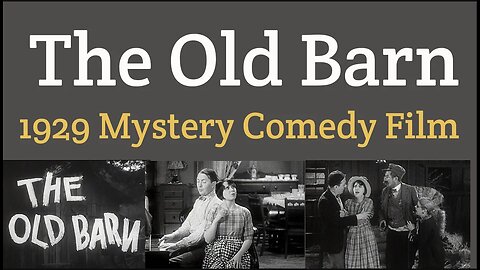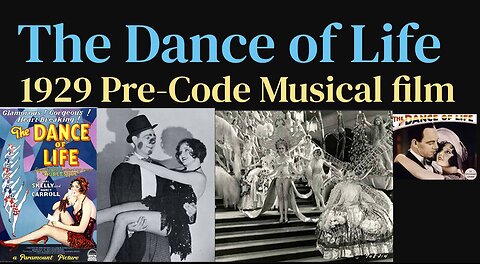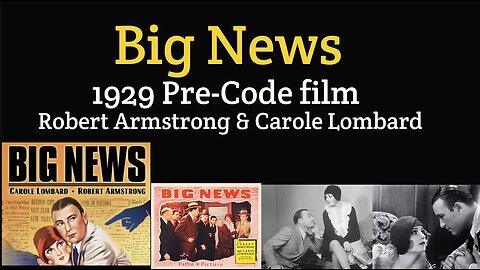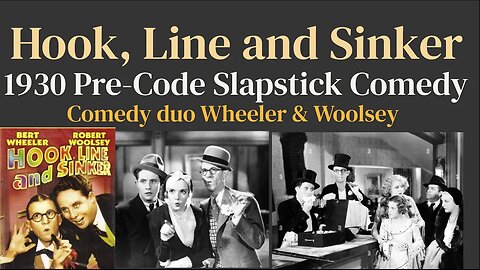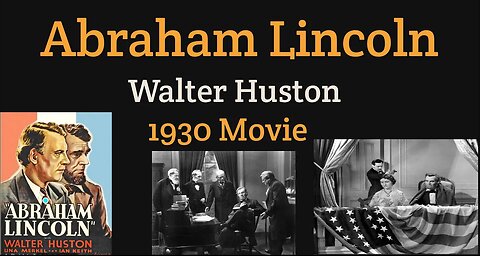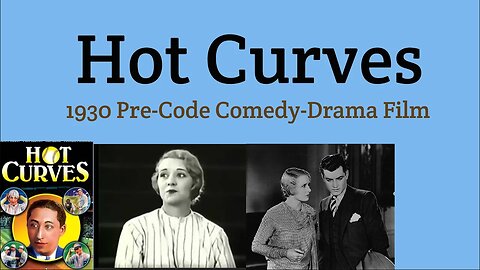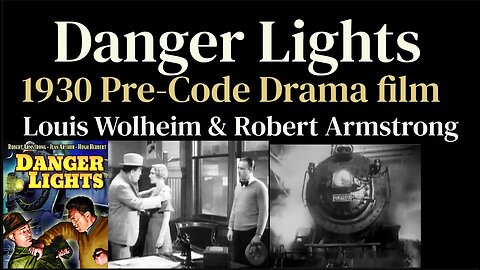
Movies
56 videos
Updated 21 days ago
Copyright Free movies to enjoy.
-
Danger Lights (1930 American Pre-Code Drama film)
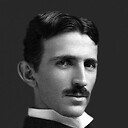 TeslaWirelessRadioDirected by George B. Seitz, from a screenplay by James Ashmore Creelman. It stars Louis Wolheim, Robert Armstrong, and Jean Arthur. The plot concerns railroading on the Chicago, Milwaukee, St. Paul and Pacific Railroad (Milwaukee Road), and the movie was largely filmed along that railroad's lines in Montana. The railway yard in Miles City, Montana, was a primary setting, while rural scenes were shot along the railway line through Sixteen Mile Canyon, Montana. Additional footage was shot in Chicago, Illinois (where the Milwaukee Road was headquartered until 1986, when it went out of business). The film was the first ever shot in the new Spoor-Berggren Natural Vision Process. PLOT Dan Thorn (Louis Wolheim) is a divisional boss on the Milwaukee Railroad, based in Miles City, Montana. The film opens with a landslide across the track and Thorn dispatching, then accompanying, a repair crew to clear it. Several hobos are lounging nearby and are put to work helping the crew. Thorn discovers that one of the hobos, Larry Doyle (Robert Armstrong), is a former railroad engineer who lost his job over insubordination. Thorn finds he likes the man and demands that he better his life by returning to work for the railroad. Doyle repeatedly refuses even as he starts the work, but Thorn is a hard man to say no to, and Doyle is hired. Cast Louis Wolheim as Dan Thorn Robert Armstrong as Larry Doyle Jean Arthur as Mary Ryan Hugh Herbert as Professor Frank Sheridan as Ed Ryan Robert Edeson as Tom Johnson Alan Roscoe as Jim William P. Burt as Chief Dispatcher James Farley as Joe Geraghty Notes Danger Lights was filmed during a period when some movie studios were experimenting with various widescreen film formats. As part of this trend, two versions of the film were created. One used standard 35mm film and Academy ratio, and the other used an experimental 65mm widescreen format at a 2:1 aspect ratio. This latter process was called "Natural Vision" and was invented by film pioneers George Kirke Spoor and P. John Berggren. The Natural Vision print of the film was reportedly screened at only two theaters (the only two with the equipment necessary to show the film), the State Lake Theater in Chicago and the Mayfair Theater in New York, and no copies of it are known to exist today. Danger Lights is the only film created using this process, and the entire effort to move to widescreen was shelved for several decades because of the increased costs of both production and presentation. The film was taken two years after the Milwaukee Road exited bankruptcy and five years before it re-entered bankruptcy and placed under trusteeship. Ten years after the second bankruptcy, the Milwaukee Road emerged from bankruptcy until it fell into bankruptcy the third time in 1977 and sold to the Soo Line Railroad in 1986. Historically significant footage Danger Lights features rare footage of a tug of war between two steam locomotives, actual documentary footage of the activities in the Miles City yard, and what is believed to be the only motion picture footage of a dynamometer car from the steam railroad era in the USA. Similar footage may have existed in MGM's Thunder (1929), with Lon Chaney, but that film now exists only in fragments, making it partly a lost film.55 views
TeslaWirelessRadioDirected by George B. Seitz, from a screenplay by James Ashmore Creelman. It stars Louis Wolheim, Robert Armstrong, and Jean Arthur. The plot concerns railroading on the Chicago, Milwaukee, St. Paul and Pacific Railroad (Milwaukee Road), and the movie was largely filmed along that railroad's lines in Montana. The railway yard in Miles City, Montana, was a primary setting, while rural scenes were shot along the railway line through Sixteen Mile Canyon, Montana. Additional footage was shot in Chicago, Illinois (where the Milwaukee Road was headquartered until 1986, when it went out of business). The film was the first ever shot in the new Spoor-Berggren Natural Vision Process. PLOT Dan Thorn (Louis Wolheim) is a divisional boss on the Milwaukee Railroad, based in Miles City, Montana. The film opens with a landslide across the track and Thorn dispatching, then accompanying, a repair crew to clear it. Several hobos are lounging nearby and are put to work helping the crew. Thorn discovers that one of the hobos, Larry Doyle (Robert Armstrong), is a former railroad engineer who lost his job over insubordination. Thorn finds he likes the man and demands that he better his life by returning to work for the railroad. Doyle repeatedly refuses even as he starts the work, but Thorn is a hard man to say no to, and Doyle is hired. Cast Louis Wolheim as Dan Thorn Robert Armstrong as Larry Doyle Jean Arthur as Mary Ryan Hugh Herbert as Professor Frank Sheridan as Ed Ryan Robert Edeson as Tom Johnson Alan Roscoe as Jim William P. Burt as Chief Dispatcher James Farley as Joe Geraghty Notes Danger Lights was filmed during a period when some movie studios were experimenting with various widescreen film formats. As part of this trend, two versions of the film were created. One used standard 35mm film and Academy ratio, and the other used an experimental 65mm widescreen format at a 2:1 aspect ratio. This latter process was called "Natural Vision" and was invented by film pioneers George Kirke Spoor and P. John Berggren. The Natural Vision print of the film was reportedly screened at only two theaters (the only two with the equipment necessary to show the film), the State Lake Theater in Chicago and the Mayfair Theater in New York, and no copies of it are known to exist today. Danger Lights is the only film created using this process, and the entire effort to move to widescreen was shelved for several decades because of the increased costs of both production and presentation. The film was taken two years after the Milwaukee Road exited bankruptcy and five years before it re-entered bankruptcy and placed under trusteeship. Ten years after the second bankruptcy, the Milwaukee Road emerged from bankruptcy until it fell into bankruptcy the third time in 1977 and sold to the Soo Line Railroad in 1986. Historically significant footage Danger Lights features rare footage of a tug of war between two steam locomotives, actual documentary footage of the activities in the Miles City yard, and what is believed to be the only motion picture footage of a dynamometer car from the steam railroad era in the USA. Similar footage may have existed in MGM's Thunder (1929), with Lon Chaney, but that film now exists only in fragments, making it partly a lost film.55 views -
Glorifying the American Girl (1929 Pre-Code Musical Comedy film)
 TeslaWirelessRadioGlorifying the American Girl is a 1929 American Pre-Code musical comedy film produced by Florenz Ziegfeld that highlights Ziegfeld Follies performers. The last third of the film, which was filmed in early Technicolor, is basically a Follies production, with appearances by Rudy Vallee, Helen Morgan, and Eddie Cantor. Rex Beach was paid $35,000 for the original story. The script for the film was written by J.P. McEvoy and Millard Webb and directed by John W. Harkrider and Millard Webb. The songs were written by Irving Berlin, Walter Donaldson, Rudolf Friml, James E. Hanley, Larry Spier and Dave Stamper. Plot The plot involves a young woman (Mary Eaton) who wants to be in the Follies, but in the meantime is making ends meet by working at a department store's sheet music department, where she sings the latest hits. She is accompanied on piano by her childhood boyfriend (Edward Crandall), who is in love with her, despite her single-minded interest in her career. When a vaudeville performer (Dan Healy) asks her to join him as his new partner, she sees it as an opportunity to make her dream come true. Upon arriving in New York City, our heroine finds out that her new partner is only interested in sleeping with her and makes this a condition of making her a star. Soon, however, she is discovered by a representative of Ziegfeld. Cast Mary Eaton as Gloria Hughes Dan Healy as Danny Miller Kaye Renard as Mooney Edward Crandall as Buddy Moore Gloria Shea as Barbara (billed as Olive Shea) Sarah Edwards as Mrs. Hughes Lou Hearn as tailor shop customer Cameo appearances Noah Beery Irving Berlin Norman Brokenshire Billie Burke Eddie Cantor Desha Delteil Charles B. Dillingham Texas Guinan Otto Kahn Nancy Kelly Ring Lardner Bull Montana Helen Morgan Tony Sansone Louis Sorin Rudy Vallee Jimmy Walker Johnny Weissmuller Joseph Urban Florenz Ziegfeld Jr. Adolph Zukor Production This Pre-Code movie is notable for being the first talkie to use the word "damn" (that credit usually goes to either Pygmalion or Gone with the Wind). The word is used twice by Sarah Edwards as well as multiple times in the skit involving Eddie Cantor, Louis Sorin and Lew Hearn. (The word was also used twice in the film Coquette, released in April of the same year.) The revue sequence contains virtual nudity and revealing costumes.148 views
TeslaWirelessRadioGlorifying the American Girl is a 1929 American Pre-Code musical comedy film produced by Florenz Ziegfeld that highlights Ziegfeld Follies performers. The last third of the film, which was filmed in early Technicolor, is basically a Follies production, with appearances by Rudy Vallee, Helen Morgan, and Eddie Cantor. Rex Beach was paid $35,000 for the original story. The script for the film was written by J.P. McEvoy and Millard Webb and directed by John W. Harkrider and Millard Webb. The songs were written by Irving Berlin, Walter Donaldson, Rudolf Friml, James E. Hanley, Larry Spier and Dave Stamper. Plot The plot involves a young woman (Mary Eaton) who wants to be in the Follies, but in the meantime is making ends meet by working at a department store's sheet music department, where she sings the latest hits. She is accompanied on piano by her childhood boyfriend (Edward Crandall), who is in love with her, despite her single-minded interest in her career. When a vaudeville performer (Dan Healy) asks her to join him as his new partner, she sees it as an opportunity to make her dream come true. Upon arriving in New York City, our heroine finds out that her new partner is only interested in sleeping with her and makes this a condition of making her a star. Soon, however, she is discovered by a representative of Ziegfeld. Cast Mary Eaton as Gloria Hughes Dan Healy as Danny Miller Kaye Renard as Mooney Edward Crandall as Buddy Moore Gloria Shea as Barbara (billed as Olive Shea) Sarah Edwards as Mrs. Hughes Lou Hearn as tailor shop customer Cameo appearances Noah Beery Irving Berlin Norman Brokenshire Billie Burke Eddie Cantor Desha Delteil Charles B. Dillingham Texas Guinan Otto Kahn Nancy Kelly Ring Lardner Bull Montana Helen Morgan Tony Sansone Louis Sorin Rudy Vallee Jimmy Walker Johnny Weissmuller Joseph Urban Florenz Ziegfeld Jr. Adolph Zukor Production This Pre-Code movie is notable for being the first talkie to use the word "damn" (that credit usually goes to either Pygmalion or Gone with the Wind). The word is used twice by Sarah Edwards as well as multiple times in the skit involving Eddie Cantor, Louis Sorin and Lew Hearn. (The word was also used twice in the film Coquette, released in April of the same year.) The revue sequence contains virtual nudity and revealing costumes.148 views -
The Old Barn (1929 Talkie Film)
 TeslaWirelessRadioPlot A motley collection of guests and regulars at a country hotel are anxious one dark and stormy night when they hear by a radio news bulletin that a dangerous criminal has just broke jail and is headed their way. A surly mystery man answering the description shows up, and then hides out in a nearby barn. Cast Johnny Burke Thelma Hill Daphne Pollard Andy Clyde Irving Bacon Vernon Dent Dave Morris Ruth Kane3 views
TeslaWirelessRadioPlot A motley collection of guests and regulars at a country hotel are anxious one dark and stormy night when they hear by a radio news bulletin that a dangerous criminal has just broke jail and is headed their way. A surly mystery man answering the description shows up, and then hides out in a nearby barn. Cast Johnny Burke Thelma Hill Daphne Pollard Andy Clyde Irving Bacon Vernon Dent Dave Morris Ruth Kane3 views -
The Dance of Life (1929 American Pre-Code Musical film)
 TeslaWirelessRadioThe Dance of Life is a 1929 American Pre-Code musical film. It is the first of three film adaptations of the popular 1927 Broadway play Burlesque, with the others being Swing High, Swing Low (1937) and When My Baby Smiles at Me (1948). The film was directed by John Cromwell (who also appeared in the film with a small part) and A. Edward Sutherland.[2] Hal Skelly appeared in the lead role as Ralph “Skid” Johnson after playing the same role in the Broadway version at the Plymouth Theater. He took part in the production for fifty-two weeks before leaving his role to take part in the film.[3] Charles D. Brown, Ralph Theodore and Oscar Levant also appeared in the Broadway production. The Dance of Life was shot at Paramount's Astoria Studios in Astoria, Queens, and included Technicolor sequences, directed by John Cromwell and A. Edward Sutherland. Plot Burlesque comic Ralph "Skid" Johnson, and specialty dancer Bonny Lee King, end up together on a cold, rainy night at a train station, after she fails an audition with a vaudeville company and he complains about her treatment by the impresario of the show and is fired. They decide to team up and apply for work with a much better show on "the big wheel" called the High Steppers Burlesque Company in Milwaukee, Wisconsin, run by Lefty Miller.[4] Miller hires the duo and the two fall in love. Later Skid asks her to marry him, but he gets drunk and ruins their wedding night. During this time a female comic, Sylvia Marco, who is attracted to Skid, tries to come between them. Cast Hal Skelly as "Skid" Johnson Nancy Carroll as Bonny King Dorothy Revier as Sylvia Marco Ralph Theodore as Harvey Howell Charles D. Brown as Lefty Al St. John as Bozo May Boley as Gussie Oscar Levant as Jerry Marjorie Kane (uncredited) John Cromwell as Speakeasy Doorkeeper Soundtrack "True Blue Lou" Music by Richard A. Whiting Lyrics by Sam Coslow and Leo Robin Sung by Hal Skelly "The Flippity Flop" Music by Richard A. Whiting Lyrics by Sam Coslow and Leo Robin "King of Jazzmania" Music by Richard A. Whiting Lyrics by Sam Coslow and Leo Robin "Ladies of the Dance" Music by Richard A. Whiting Lyrics by Sam Coslow and Leo Robin "Cuddlesome Baby" Music by Richard A. Whiting Lyrics by Sam Coslow and Leo Robin "Mightiest Matador" Music by Richard A. Whiting Lyrics by Sam Coslow and Leo Robin "Sweet Rosie O'Grady" Written by Maude Nugent "In the Gloaming" Music by Annie Fortescue Harrison Lyrics by Meta Orred "Sam, the Old Accordion Man" Written by Walter Donaldson95 views
TeslaWirelessRadioThe Dance of Life is a 1929 American Pre-Code musical film. It is the first of three film adaptations of the popular 1927 Broadway play Burlesque, with the others being Swing High, Swing Low (1937) and When My Baby Smiles at Me (1948). The film was directed by John Cromwell (who also appeared in the film with a small part) and A. Edward Sutherland.[2] Hal Skelly appeared in the lead role as Ralph “Skid” Johnson after playing the same role in the Broadway version at the Plymouth Theater. He took part in the production for fifty-two weeks before leaving his role to take part in the film.[3] Charles D. Brown, Ralph Theodore and Oscar Levant also appeared in the Broadway production. The Dance of Life was shot at Paramount's Astoria Studios in Astoria, Queens, and included Technicolor sequences, directed by John Cromwell and A. Edward Sutherland. Plot Burlesque comic Ralph "Skid" Johnson, and specialty dancer Bonny Lee King, end up together on a cold, rainy night at a train station, after she fails an audition with a vaudeville company and he complains about her treatment by the impresario of the show and is fired. They decide to team up and apply for work with a much better show on "the big wheel" called the High Steppers Burlesque Company in Milwaukee, Wisconsin, run by Lefty Miller.[4] Miller hires the duo and the two fall in love. Later Skid asks her to marry him, but he gets drunk and ruins their wedding night. During this time a female comic, Sylvia Marco, who is attracted to Skid, tries to come between them. Cast Hal Skelly as "Skid" Johnson Nancy Carroll as Bonny King Dorothy Revier as Sylvia Marco Ralph Theodore as Harvey Howell Charles D. Brown as Lefty Al St. John as Bozo May Boley as Gussie Oscar Levant as Jerry Marjorie Kane (uncredited) John Cromwell as Speakeasy Doorkeeper Soundtrack "True Blue Lou" Music by Richard A. Whiting Lyrics by Sam Coslow and Leo Robin Sung by Hal Skelly "The Flippity Flop" Music by Richard A. Whiting Lyrics by Sam Coslow and Leo Robin "King of Jazzmania" Music by Richard A. Whiting Lyrics by Sam Coslow and Leo Robin "Ladies of the Dance" Music by Richard A. Whiting Lyrics by Sam Coslow and Leo Robin "Cuddlesome Baby" Music by Richard A. Whiting Lyrics by Sam Coslow and Leo Robin "Mightiest Matador" Music by Richard A. Whiting Lyrics by Sam Coslow and Leo Robin "Sweet Rosie O'Grady" Written by Maude Nugent "In the Gloaming" Music by Annie Fortescue Harrison Lyrics by Meta Orred "Sam, the Old Accordion Man" Written by Walter Donaldson95 views -
Big News (1929 American Pre-Code film)
 TeslaWirelessRadioBig News is a 1929 American Pre-Code film directed by Gregory La Cava, released by Pathé Exchange, and starring Robert Armstrong and Carole Lombard, billed as "Carol Lombard". Cast Robert Armstrong as Steve Banks Carole Lombard as Margaret Banks (billed as Carol Lombard) Louis Payne as Hensel Wade Boteler as O'Neill Charles Sellon as Addison Sam Hardy as Reno Tom Kennedy as Officer Ryan Warner Richmond as District Attorney Phelps Helen Ainsworth as Vera, society editor James Donlan as Deke George "Gabby" Hayes as Hoffman, reporter Vernon Steele as reporter Clarence Wilson as Coroner Colin Chase as Birn Robert Dudley as Telegraph editor Plot Steve Banks (Armstrong) is a hard-drinking newspaper reporter. His wife Margaret (Lombard), a reporter for a rival paper, threatens to divorce him if he doesn't quit the drinking that is compromising his career. Steve pursues a story about drug dealers even when his editor fires him. When the editor is murdered, Steve is accused of the killing. Preservation status The film exists in a 16mm reduction print11 views
TeslaWirelessRadioBig News is a 1929 American Pre-Code film directed by Gregory La Cava, released by Pathé Exchange, and starring Robert Armstrong and Carole Lombard, billed as "Carol Lombard". Cast Robert Armstrong as Steve Banks Carole Lombard as Margaret Banks (billed as Carol Lombard) Louis Payne as Hensel Wade Boteler as O'Neill Charles Sellon as Addison Sam Hardy as Reno Tom Kennedy as Officer Ryan Warner Richmond as District Attorney Phelps Helen Ainsworth as Vera, society editor James Donlan as Deke George "Gabby" Hayes as Hoffman, reporter Vernon Steele as reporter Clarence Wilson as Coroner Colin Chase as Birn Robert Dudley as Telegraph editor Plot Steve Banks (Armstrong) is a hard-drinking newspaper reporter. His wife Margaret (Lombard), a reporter for a rival paper, threatens to divorce him if he doesn't quit the drinking that is compromising his career. Steve pursues a story about drug dealers even when his editor fires him. When the editor is murdered, Steve is accused of the killing. Preservation status The film exists in a 16mm reduction print11 views -
The Bees' Buzz (1929 "Talkie" Comedy film)
 TeslaWirelessRadioThe Bees' Buzz is a 1929 American film directed by Mack Sennett. Plot Andy and Harry get into trouble while trying to stop the marriage of Andy's daughter. Cast Harry Gribbon as Homer Ashcraft Andy Clyde as Peggy's father Barbara Leonard as Peggy Tyler Brooke as Peggy's suitor Vernon Dent as Jim Ruth Kane as A party guest Billy Gilbert51 views
TeslaWirelessRadioThe Bees' Buzz is a 1929 American film directed by Mack Sennett. Plot Andy and Harry get into trouble while trying to stop the marriage of Andy's daughter. Cast Harry Gribbon as Homer Ashcraft Andy Clyde as Peggy's father Barbara Leonard as Peggy Tyler Brooke as Peggy's suitor Vernon Dent as Jim Ruth Kane as A party guest Billy Gilbert51 views -
Hook, Line and Sinker (1930 Pre-Code Slapstick Comedy film)
 TeslaWirelessRadioDirected by Edward F. Cline from a screenplay by Ralph Spence and Tim Whelan. It was the third starring vehicle for the comedy team of Wheeler & Woolsey (Bert Wheeler and Robert Woolsey), and also featured Dorothy Lee. It would be one of the largest financial successes for RKO Pictures in 1930. Plot Two fast-talking insurance salesmen — Wilbur Boswell and J. Addington Ganzy — help penniless socialite Mary Marsh to turn a dilapidated hotel, which was willed to her, into a thriving success. They soon run into trouble, however, in the form of two sets of rival gangsters who want to break into the hotel safe; also, Mary's mother, Rebecca Marsh, wants her to marry wealthy lawyer John Blackwell, although Mary has fallen in love with Wilbur. Cast Bert Wheeler as Wilbur Boswell Robert Woolsey as Addington Ganzy Dorothy Lee as Mary Marsh Jobyna Howland as Rebecca Marsh Ralf Harolde as John Blackwell (Buffalo Blackie) William B. Davidson as Frank Dukette (Duke of Winchester) Natalie Moorhead as Duchess Bessie Von Essie George F. Marion as Ritz De La Rivera Bellboy Hugh Herbert as Hotel House Detective Stanley Fields as McKay Reception The film made a profit of $225,000, and would be one of the top two money earners for RKO Radio Pictures in 1930.37 views
TeslaWirelessRadioDirected by Edward F. Cline from a screenplay by Ralph Spence and Tim Whelan. It was the third starring vehicle for the comedy team of Wheeler & Woolsey (Bert Wheeler and Robert Woolsey), and also featured Dorothy Lee. It would be one of the largest financial successes for RKO Pictures in 1930. Plot Two fast-talking insurance salesmen — Wilbur Boswell and J. Addington Ganzy — help penniless socialite Mary Marsh to turn a dilapidated hotel, which was willed to her, into a thriving success. They soon run into trouble, however, in the form of two sets of rival gangsters who want to break into the hotel safe; also, Mary's mother, Rebecca Marsh, wants her to marry wealthy lawyer John Blackwell, although Mary has fallen in love with Wilbur. Cast Bert Wheeler as Wilbur Boswell Robert Woolsey as Addington Ganzy Dorothy Lee as Mary Marsh Jobyna Howland as Rebecca Marsh Ralf Harolde as John Blackwell (Buffalo Blackie) William B. Davidson as Frank Dukette (Duke of Winchester) Natalie Moorhead as Duchess Bessie Von Essie George F. Marion as Ritz De La Rivera Bellboy Hugh Herbert as Hotel House Detective Stanley Fields as McKay Reception The film made a profit of $225,000, and would be one of the top two money earners for RKO Radio Pictures in 1930.37 views -
Abraham Lincoln (1930) Pre-Code Biographical film
 TeslaWirelessRadioAbraham Lincoln, also released under the title D. W. Griffith's "Abraham Lincoln", is a 1930 pre-Code American biographical film about Abraham Lincoln directed by D. W. Griffith. It stars Walter Huston as Lincoln and Una Merkel, in her second speaking role, as Ann Rutledge. The script was co-written by Stephen Vincent Benét, author of the Civil War prose poem John Brown's Body (1928), and Gerrit Lloyd. This was the first of only two sound films made by Griffith. Plot summary The first act of the film covers Lincoln's early life as a storekeeper and rail-splitter in New Salem and his early romance with Ann Rutledge, and his early years as a lawyer and his courtship and marriage to Mary Todd in Springfield, Illinois. The majority of the film deals with Lincoln's presidency during the American Civil War and culminates with Lee's surrender and Lincoln's assassination at Ford's Theatre. Cast Walter Huston as Abraham Lincoln Una Merkel as Ann Rutledge Characters in the order of their appearance W. L. Thorne as Tom Lincoln Lucille La Verne as Mid-Wife Helen Freeman as Nancy Hanks Lincoln Otto Hoffman as Offut Walter Huston as Abraham Lincoln Edgar Deering as Armstrong Una Merkel as Ann Rutledge Russell Simpson as Lincoln's Employer Charles Crockett as Sheriff Kay Hammond as Mary Todd Lincoln Helen Ware as Mrs. Edwards E. Alyn Warren as Stephen A. Douglas Jason Robards as Herndon Gordon Thorpe as Tad Lincoln Ian Keith as John Wilkes Booth Cameron Prudhomme as John Hay (secretary to the president) James Bradbury, Sr. as General Scott Jimmie Eagle as Young Soldier E. Alyn Warren as General Grant Oscar Apfel as Secretary of War Stanton Frank Campeau as General Sheridan Hobart Bosworth as General Lee Henry B. Walthall as Colonel Marshall Reception The film received positive reviews from contemporary critics. Mordaunt Hall of The New York Times called it "quite a worthy pictorial offering with a genuinely fine and inspiring performance by Walter Huston in the role of the martyred President"[3] and later put it on his year-end list of the ten best films of 1930. Historical accuracy The film covers some little-known aspects of Lincoln's early life, such as his romance with Ann Rutledge, his depression and feared suicidal tendencies after her death, and his unexplained breaking off of his engagement with Mary Todd. However, the film surmises that was because of unresolved feelings over Ann Rutledge, and it adds a dramatic scene in which Lincoln stands Mary up on their scheduled wedding day. In reality, Lincoln broke off the engagement but before the wedding day. He would later regret his decision, return to ask Mary's hand in marriage once again, and follow through this time, as happens in the film. While the early scenes of Lincoln's life are remarkably accurate, many of the later scenes contain historical inaccuracies. The Lincoln-Douglas debates, in addition to the historically-accurate topic of the extension of slavery, are turned into an argument about secession. Lincoln was an underdog for the Republican Presidential nomination in 1860 although the film suggests that he was the sole nominee as a result of the Lincoln-Douglas debates. The outbreak of the Civil War seems to be the Union firing on Charleston, South Carolina from Fort Sumter, rather than the other way around. Also, early in hostilities, General Winfield Scott is depicted as being overconfident of a quick victory and something of a buffoon, but in reality, he was one of the voices in the minority claiming the war would be long, costly, and bloody. In the film, Lincoln receives a report from the Secret Service that some Copperheads in the North have issued threats against him. However, in reality, the Secret Service was not created until two months after Lincoln's death. Finally, in the film's climax, Lincoln delivers a conflation of the words of the Gettysburg Address and Second Inaugural Address at Ford's Theatre on April 14, 1865, just moments before his assassination. That was Griffith's second portrayal of Lincoln's assassination, the first being in The Birth of a Nation.159 views
TeslaWirelessRadioAbraham Lincoln, also released under the title D. W. Griffith's "Abraham Lincoln", is a 1930 pre-Code American biographical film about Abraham Lincoln directed by D. W. Griffith. It stars Walter Huston as Lincoln and Una Merkel, in her second speaking role, as Ann Rutledge. The script was co-written by Stephen Vincent Benét, author of the Civil War prose poem John Brown's Body (1928), and Gerrit Lloyd. This was the first of only two sound films made by Griffith. Plot summary The first act of the film covers Lincoln's early life as a storekeeper and rail-splitter in New Salem and his early romance with Ann Rutledge, and his early years as a lawyer and his courtship and marriage to Mary Todd in Springfield, Illinois. The majority of the film deals with Lincoln's presidency during the American Civil War and culminates with Lee's surrender and Lincoln's assassination at Ford's Theatre. Cast Walter Huston as Abraham Lincoln Una Merkel as Ann Rutledge Characters in the order of their appearance W. L. Thorne as Tom Lincoln Lucille La Verne as Mid-Wife Helen Freeman as Nancy Hanks Lincoln Otto Hoffman as Offut Walter Huston as Abraham Lincoln Edgar Deering as Armstrong Una Merkel as Ann Rutledge Russell Simpson as Lincoln's Employer Charles Crockett as Sheriff Kay Hammond as Mary Todd Lincoln Helen Ware as Mrs. Edwards E. Alyn Warren as Stephen A. Douglas Jason Robards as Herndon Gordon Thorpe as Tad Lincoln Ian Keith as John Wilkes Booth Cameron Prudhomme as John Hay (secretary to the president) James Bradbury, Sr. as General Scott Jimmie Eagle as Young Soldier E. Alyn Warren as General Grant Oscar Apfel as Secretary of War Stanton Frank Campeau as General Sheridan Hobart Bosworth as General Lee Henry B. Walthall as Colonel Marshall Reception The film received positive reviews from contemporary critics. Mordaunt Hall of The New York Times called it "quite a worthy pictorial offering with a genuinely fine and inspiring performance by Walter Huston in the role of the martyred President"[3] and later put it on his year-end list of the ten best films of 1930. Historical accuracy The film covers some little-known aspects of Lincoln's early life, such as his romance with Ann Rutledge, his depression and feared suicidal tendencies after her death, and his unexplained breaking off of his engagement with Mary Todd. However, the film surmises that was because of unresolved feelings over Ann Rutledge, and it adds a dramatic scene in which Lincoln stands Mary up on their scheduled wedding day. In reality, Lincoln broke off the engagement but before the wedding day. He would later regret his decision, return to ask Mary's hand in marriage once again, and follow through this time, as happens in the film. While the early scenes of Lincoln's life are remarkably accurate, many of the later scenes contain historical inaccuracies. The Lincoln-Douglas debates, in addition to the historically-accurate topic of the extension of slavery, are turned into an argument about secession. Lincoln was an underdog for the Republican Presidential nomination in 1860 although the film suggests that he was the sole nominee as a result of the Lincoln-Douglas debates. The outbreak of the Civil War seems to be the Union firing on Charleston, South Carolina from Fort Sumter, rather than the other way around. Also, early in hostilities, General Winfield Scott is depicted as being overconfident of a quick victory and something of a buffoon, but in reality, he was one of the voices in the minority claiming the war would be long, costly, and bloody. In the film, Lincoln receives a report from the Secret Service that some Copperheads in the North have issued threats against him. However, in reality, the Secret Service was not created until two months after Lincoln's death. Finally, in the film's climax, Lincoln delivers a conflation of the words of the Gettysburg Address and Second Inaugural Address at Ford's Theatre on April 14, 1865, just moments before his assassination. That was Griffith's second portrayal of Lincoln's assassination, the first being in The Birth of a Nation.159 views -
Hot Curves (1930 Pre-Code) Comedy Drama film
 TeslaWirelessRadioHot Curves is a 1930 American Pre-Code comedy-drama film produced and distributed by Tiffany Pictures and directed by Norman Taurog. A print is held by the Library of Congress. Rex Lease, Benny Rubin and Alice Day star. The supporting cast features Pert Kelton. Plot Jim Dolan, with a little help from his grandmother, shows the Pittsburgh baseball team what a good pitcher he can be. Jim also becomes involved in romance with Elaine, the manager's daughter, while Maizie, a gold digger, schemes to come between them. Ballpark vendor Benny, by coincidence, becomes the team's catcher while his quirky sweetheart, Cookie, cheers him on. Jim becomes arrogant, alienates teammates and is even suspended, but snaps out of it in time to save the big game of the World Series. Cast Benny Rubin - Benny Goldberg Rex Lease - Jim Dolan Alice Day - Elaine McGrew Pert Kelton - Cookie John Ince - Mr McGrew, Baseball Team Manager, Elaine's father Mary Carr - "Grandma Dolan" Mike Donlin - Baseball Team Scout Natalie Moorhead - Maizie Paul Hurst - "Slug" (a baseball player) Henry Hall - Baseball Team Owner Marceline Day - Girl Robert Livingston - a baseball player (billed as Robert Randall) Greta Granstedt - Girl30 views
TeslaWirelessRadioHot Curves is a 1930 American Pre-Code comedy-drama film produced and distributed by Tiffany Pictures and directed by Norman Taurog. A print is held by the Library of Congress. Rex Lease, Benny Rubin and Alice Day star. The supporting cast features Pert Kelton. Plot Jim Dolan, with a little help from his grandmother, shows the Pittsburgh baseball team what a good pitcher he can be. Jim also becomes involved in romance with Elaine, the manager's daughter, while Maizie, a gold digger, schemes to come between them. Ballpark vendor Benny, by coincidence, becomes the team's catcher while his quirky sweetheart, Cookie, cheers him on. Jim becomes arrogant, alienates teammates and is even suspended, but snaps out of it in time to save the big game of the World Series. Cast Benny Rubin - Benny Goldberg Rex Lease - Jim Dolan Alice Day - Elaine McGrew Pert Kelton - Cookie John Ince - Mr McGrew, Baseball Team Manager, Elaine's father Mary Carr - "Grandma Dolan" Mike Donlin - Baseball Team Scout Natalie Moorhead - Maizie Paul Hurst - "Slug" (a baseball player) Henry Hall - Baseball Team Owner Marceline Day - Girl Robert Livingston - a baseball player (billed as Robert Randall) Greta Granstedt - Girl30 views

